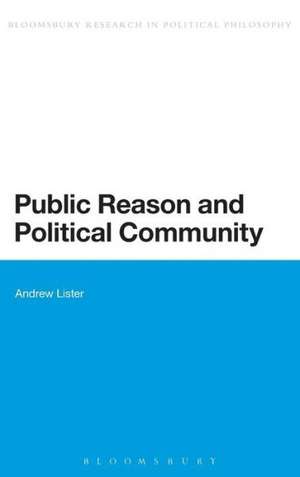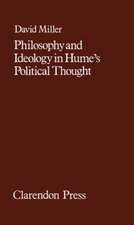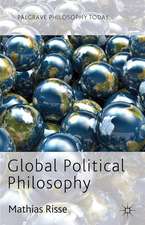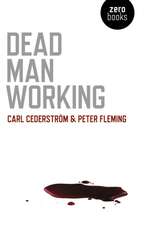Public Reason and Political Community: Bloomsbury Research in Political Philosophy
Autor Dr Andrew Listeren Limba Engleză Hardback – 23 oct 2013
| Toate formatele și edițiile | Preț | Express |
|---|---|---|
| Paperback (1) | 237.37 lei 6-8 săpt. | |
| Bloomsbury Publishing – 24 aug 2016 | 237.37 lei 6-8 săpt. | |
| Hardback (1) | 773.81 lei 6-8 săpt. | |
| Bloomsbury Publishing – 23 oct 2013 | 773.81 lei 6-8 săpt. |
Preț: 773.81 lei
Preț vechi: 990.47 lei
-22% Nou
Puncte Express: 1161
Preț estimativ în valută:
148.09€ • 154.28$ • 123.13£
148.09€ • 154.28$ • 123.13£
Carte tipărită la comandă
Livrare economică 08-22 februarie 25
Preluare comenzi: 021 569.72.76
Specificații
ISBN-13: 9781780936574
ISBN-10: 1780936575
Pagini: 248
Ilustrații: 2 illus
Dimensiuni: 156 x 234 x 25 mm
Greutate: 0.52 kg
Ediția:New.
Editura: Bloomsbury Publishing
Colecția Bloomsbury Academic
Seria Bloomsbury Research in Political Philosophy
Locul publicării:London, United Kingdom
ISBN-10: 1780936575
Pagini: 248
Ilustrații: 2 illus
Dimensiuni: 156 x 234 x 25 mm
Greutate: 0.52 kg
Ediția:New.
Editura: Bloomsbury Publishing
Colecția Bloomsbury Academic
Seria Bloomsbury Research in Political Philosophy
Locul publicării:London, United Kingdom
Caracteristici
Investigates
issues
central
to
liberal
theory,
e.g.
relationships
between
neutrality,
paternalism
and
equal
treatment.
Notă biografică
Andrew
Lister
is
Associate
Professor
in
the
Department
of
Political
Studies,
Queen's
University,
Kingston,
Ontario,
Canada.
Cuprins
Preface1.
Public
Reason
in
Practice
and
Theory
2.
False
Starts:
Unsuccessful
Justifications
of
Public
Reason
3.
Respect
for
Persons
as
a
Constraint
on
Coercion4.
The
Higher-Order
Unanimity
Escape
Clause
5.
Civic
Friendship
as
a
Constraint
on
Reasons
for
Decision6.
Public
Reason
and
(Same-Sex)
Marriage7.
ConclusionNotesBibliography
Index
Recenzii
Public
Reason
and
Political
Communityoffers
an
extremely
interesting
and
provocative
analysis
of
a
topic
whose
philosophical
and
practical
importance
will
only
continue
to
increase.
Lister's
argument
is
certain
to
stimulate
productive
debate,
and
is
deserving
of
widespread
engagement
both
within
and
beyond
the
academy.
Public Reason and Political Communityhas many strengths, especially its original attempt to provide a civic friendship foundation for political liberalism [.] Lister makes clear that public reason liberals must face up to the anti-perfectionist dilemma, something many in the literature have not recognized. Further, he has invented several new approaches to public reason to help solve the dilemma -- strategies with which all interested parties should become familiar.Public Reason and Political Communityis thus a significant contribution to an ongoing and fruitful research program. Most importantly, Lister helps us understand how to live on moral terms with citizens who disagree with us about important matters. That is a significant achievement.
With his book, Andrew Lister contributes to a better understanding of the principle of public justification and its foundation.
Talk of "public reason" has been ubiquitous in recent political philosophy. But there have only been a small number of attempts to unpack and defend the concept systematically. Andrew Lister's book performs a vital service in providing a very perspicuous account of how the concept can be grounded, and how it can substantively shape public debate on hot-button issues such as same-sex marriage. This book will be an important touchstone for discussion for years to come.
Public Reason and Political Communityis a careful defence of the "shared reasons" approach to public reason. Appealing only to reasons for political decisions that can be shared with fellow citizens, Lister argues, makes possible civic friendship across deep moral differences. In the course of his analysis Lister engages with a wide variety of philosophers, both friends and skeptics of the public reason approach to political philosophy, and shows how his account can be brought to bear on public policy.Public Reason and Political Communityis an important contribution to the ongoing project of analyzing the conditions under which people with fundamentally clashing moral commitments can live together in a community of respect. In this book Lister shows himself to be one of the leading theorists of public reason.
Andrew Lister offers a novel account of public reason that links to the importance for mutual respect among members of a democratic community. In making his case, he blends a sophisticated discussion of the recent philosophical literature with an analysis of how this idea manifests itself in a variety of ways in debates among citizens in a number of policy areas.
Public reason and public justification have become central to understanding both the theory and practice of liberalism. Lister offers a clear and compelling account of these two concepts that adds much needed detail to the debate.
Public Reason and Political Communityhas many strengths, especially its original attempt to provide a civic friendship foundation for political liberalism [.] Lister makes clear that public reason liberals must face up to the anti-perfectionist dilemma, something many in the literature have not recognized. Further, he has invented several new approaches to public reason to help solve the dilemma -- strategies with which all interested parties should become familiar.Public Reason and Political Communityis thus a significant contribution to an ongoing and fruitful research program. Most importantly, Lister helps us understand how to live on moral terms with citizens who disagree with us about important matters. That is a significant achievement.
With his book, Andrew Lister contributes to a better understanding of the principle of public justification and its foundation.
Talk of "public reason" has been ubiquitous in recent political philosophy. But there have only been a small number of attempts to unpack and defend the concept systematically. Andrew Lister's book performs a vital service in providing a very perspicuous account of how the concept can be grounded, and how it can substantively shape public debate on hot-button issues such as same-sex marriage. This book will be an important touchstone for discussion for years to come.
Public Reason and Political Communityis a careful defence of the "shared reasons" approach to public reason. Appealing only to reasons for political decisions that can be shared with fellow citizens, Lister argues, makes possible civic friendship across deep moral differences. In the course of his analysis Lister engages with a wide variety of philosophers, both friends and skeptics of the public reason approach to political philosophy, and shows how his account can be brought to bear on public policy.Public Reason and Political Communityis an important contribution to the ongoing project of analyzing the conditions under which people with fundamentally clashing moral commitments can live together in a community of respect. In this book Lister shows himself to be one of the leading theorists of public reason.
Andrew Lister offers a novel account of public reason that links to the importance for mutual respect among members of a democratic community. In making his case, he blends a sophisticated discussion of the recent philosophical literature with an analysis of how this idea manifests itself in a variety of ways in debates among citizens in a number of policy areas.
Public reason and public justification have become central to understanding both the theory and practice of liberalism. Lister offers a clear and compelling account of these two concepts that adds much needed detail to the debate.





















